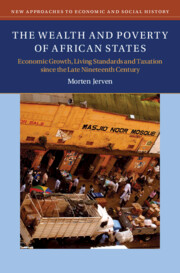 The Wealth and Poverty of African States
The Wealth and Poverty of African States Published online by Cambridge University Press: 06 January 2022
How have African states evolved over time? This chapter addresses the prominent debate in the social sciences concerning the role and persistence of “institutions” and examines the composition of government revenues, as well as the level of tax extraction, for all territories in Africa from 1890 to 2010. The chapter builds on a database with consistent long time series on government revenues for the entire continent, thus opening up new lines of inquiry into the evolution of African statehood.The chapter presents real per capita tax rates for countries across the 20th century and makes some analytical contributions, by proposing typologies of development patterns in taxation. Trends in taxation are not uniform, and some countries follow distinct paths. This takes us some way toward distilling what the relevant empirical and theoretical questions are – those that could and should be asked about levels and trends in taxation in African countries across the twentieth century. The chapter presents a general continent-wide trend in taxation (subject to much country variation), where increases in taxation from the beginning of the nineteenth century through the 1960s and into the 1970s are seen, followed by a decrease in the 1980s.
To save this book to your Kindle, first ensure [email protected] is added to your Approved Personal Document E-mail List under your Personal Document Settings on the Manage Your Content and Devices page of your Amazon account. Then enter the ‘name’ part of your Kindle email address below. Find out more about saving to your Kindle.
Note you can select to save to either the @free.kindle.com or @kindle.com variations. ‘@free.kindle.com’ emails are free but can only be saved to your device when it is connected to wi-fi. ‘@kindle.com’ emails can be delivered even when you are not connected to wi-fi, but note that service fees apply.
Find out more about the Kindle Personal Document Service.
To save content items to your account, please confirm that you agree to abide by our usage policies. If this is the first time you use this feature, you will be asked to authorise Cambridge Core to connect with your account. Find out more about saving content to Dropbox.
To save content items to your account, please confirm that you agree to abide by our usage policies. If this is the first time you use this feature, you will be asked to authorise Cambridge Core to connect with your account. Find out more about saving content to Google Drive.